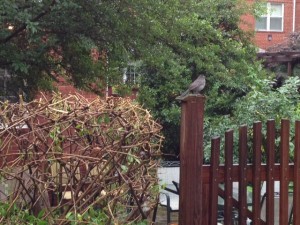
Part of good gardening, and yard work, is respecting the life that uses the space. The yard work that I came home to today, which we so desperately needed due to the invasive vines that had taken over, was the exact opposite of respectful. The skeletal hedges in this photo illustrate this mean, lazy, and expensive work. People swooped in and hacked everything to pieces as fast as they could in order to make a buck. Respect wasn’t even shown for the plant life. The roots to the invasive vines are still there (I can see them) and trimmings were left laying on the ivy beds.
The bird sitting on the gate is a catbird. He used to care for a nest with babies. Now, he keeps fluttering around the patio and landing in that same spot to look over where the nest used to be. Whether my roommate had let the workers know the nest was there or not, they should have seen it and been more careful.
I know catbirds aren’t everyone’s favorite. They are territorial and sometimes attack other birds. But I’ve been watching this one, and all he cared about was that nest. I liked sitting on the patio and listening to him sing and watching him fly in and out of the hedge working on his family. He often woke me up at 3 and 4am performing his best imitation of a mockingbird. I’m sure I’m so upset because I will miss him if he decides to move on.
And I’m sure he will because our yard is no longer suitable for hiding nests. Nor is it clear if his partner survived the “attack” or is nearby. He looks lost and I wonder what that means. The cycle of life for us doesn’t seem so much a system or pattern, because we live so long and we have our brains to keep us company. Obviously, humans have more to grieve when a loved one is lost. But I wonder with birds (and animals in general), when they lose a loved one, is it a break in their life cycle pattern? When the pattern of a catbird calls for 2 to 3 nests per season and one suddenly disappears, how long before the bird is able to move on and start the next nest? Is it too confusing and therefore changes their whole life game? Or do they instinctively forget and just start over? This bird looks more confused than forgetful.
And do birds mourn? I looked this up. Apparently some birds, like the western scrub jay, do. There is evidence that bigger-brained animals like the elephant and horse also exhibit signs of grieving. Anthropologist Barbara King studied animal grieving behavior for two years and wrote a book about it.
I hope this little catbird, when he’s feeling better, will stick around and try again, maybe in a neighbor’s hedge. I never thought I’d ever hear myself say, “I will miss my 3am wake-up call.”
P.S. The spider I wrote about yesterday is also gone. I’m eating consolation ice cream and trying to decide how I feel about that.
